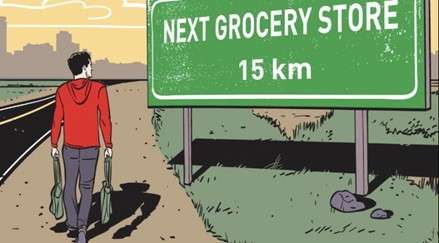
Last month in On Sight, we provided strategies for healthy eating, including tips for navigating the grocery store, shopping online, and phone apps and services for shoppers with vision loss. We also shared suggestions for safe food prep and kitchen work. Eating healthy is an important part of staying well. However, many people with disabilities face systemic barriers that limit their access to healthy food. In this article, we explore some root causes of food insecurity and suggest some specific resources that may help if you’re struggling to put healthy food on the table.
Economic hardship is one of several factors that contribute to food insecurity. Older people with visual impairment are much more likely than the overall population to have limited income. Thirty percent of older adults with vision loss in Wisconsin have annual incomes below $20,000. One agency older residents who find themselves in that situation can turn to is their county’s Aging and Disability Resource Center (ADRC). Administered by the Wisconsin Department of Health Services, ADRCs are an invaluable resource.
“I always see the ADRC for each county as an excellent starting point for people,” says Executive Director Denise Jess of the Council. “A good information and referral specialist will know that if income is an issue for getting food, it is likely also an issue for getting medications, paying for heating and cooling, or even managing housing costs. They can assist someone in getting directed to appropriate services in their area.”
You can access ADRC services in several ways:
- Call your local ADRC on the phone.
- Schedule a home visit with your local ADRC.
- Visit your local ADRC in person.
You can find the ADRC office that serves your area on the Department of Health Services (DHS) website.
Tribal members can get help from the local ADRC or they can consult a Tribal Aging and Disability Resource Specialist (ADRS).
ADRCs can be an access point for a range of programs related to food and nutrition. You can learn more about these programs on the Nutrition a Food Assistance page of the DHS website.
Being financially challenged is far from the only cause of food insecurity. Where a person lives can also affect their access to healthy food. Both urban and rural areas can be “food deserts” where there are no good options for obtaining groceries. In low-income urban neighborhoods, the only places to buy food may be gas station quick marts. In rural areas, food stores may be far apart, requiring some residents to travel significant distances to buy groceries. Given the lack of transit options in most rural areas, the problem is particularly acute for nondrivers.
In these situations, the ADRC may be able to assist with finding transportation to a grocery store. The ADRC can connect you with a mobility manager, who may even be housed within the agency.
Local food pantries can also be helpful. In addition to maintaining a cupboard or a meal site near you, the pantry may also offer a delivery service. You can locate a pantry using Second Harvest’s Find Food Near You tool.
For those who have internet access, there are several helpful grocery shopping apps and other online resources.
- Instacart is a local service that will fill your store order to deliver groceries to your residence at a requested time.
- Shipt is another online food delivery/grocery shopping service.
- Uber Eats will shop for you and does well with Access Technology.
- Hadley has a wonderful series of online workshops on cooking with low vision.
Help is also available for people who want to develop or sharpen their food preparation skills. DHS’s Office for the Blind and Visually Impaired (OBVI) provides in-home vision rehabilitation sessions statewide. Vision Forward in Milwaukee also offers instruction on daily living tasks including food preparation.
And of course, help from the Council is just a phone call away. To schedule a kitchen consultation with a member of the Council’s Vision Services team, call us at 608-255-1166 or send an email to info@WCBlind.org.

